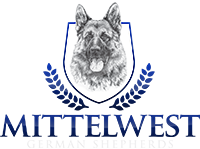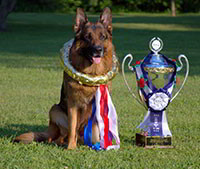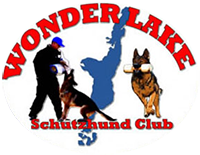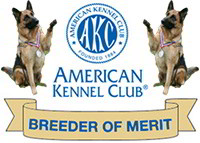Long-haired German Shepherds are among the most striking breeds, known for their luxurious coats and loyal dispositions. While they share many traits with their short-haired counterparts, they have unique needs, particularly concerning their health.
Whether you’re a prospective owner or already have one in your life, understanding these needs is critical to fostering a long and healthy life for your dog. This guide offers detailed insights into their care, health standards, and how to find the right breeder.

Exploring The Beauty Of Long-Haired German Shepherds
Long-haired German Shepherds are renowned for their majestic appearance, which sets them apart from the standard breed. Their long, flowing coats often lack the dense undercoat typical of short-haired GSDs, giving them a sleek and elegant look. This difference isn’t just cosmetic—it has implications for grooming and care.
These dogs display robust and athletic physiques, with muscular builds that highlight their heritage as working dogs. Their strong frames support tasks requiring strength and stamina. Erect ears, almond-shaped eyes, and bushy tails create an alert and noble demeanor, enhancing their iconic appearance.
Weight and height often vary, influenced by genetics, diet, and activity levels. Males typically weigh 65 to 90 pounds and measure 24 to 26 inches at the shoulder. Females, slightly smaller, usually weigh 50 to 70 pounds and stand 22 to 24 inches tall. Breeding purposes, such as for show or work, may also affect their size.
Some long-haired German Shepherds lack a dense undercoat, making them less suited to extreme weather conditions. While their long fur provides some protection, they may be more vulnerable to temperature extremes than their double-coated relatives. This characteristic requires owners to be mindful of their comfort during hot summers and cold winters.
Identifying Common Health Challenges For These Dogs
Long-haired German Shepherds share many health risks as their short-haired counterparts, but their distinctive coats can bring additional considerations. Some conditions arise from genetic factors and are shared across the breed, regardless of coat type. However, grooming and skin care needs may differ, requiring owners to adapt their approach.
Hip Dysplasia
Hip dysplasia, including the long-haired variety, is a common concern for all German Shepherds. This condition occurs when the hip joint develops improperly, causing misalignment between the femur and hip socket. Over time, this misalignment leads to discomfort, reduced mobility, and even arthritis.
The condition is primarily genetic but can worsen due to rapid growth during puppyhood or carrying excess weight. Being an active and athletic breed, long-haired German Shepherds may show signs such as stiffness, reluctance to climb stairs, or difficulty standing after rest. Early detection is key to managing the progression of this joint disorder.
Elbow Dysplasia
Like hip dysplasia, elbow dysplasia is another orthopedic issue in the breed. This condition involves the improper development of the elbow joint, which can result in pain, inflammation, and lameness. It is most noticeable during a dog’s growth phase and may progressively worsen without intervention.
Long-haired German Shepherds are at no greater risk of elbow dysplasia than their short-haired counterparts, but their size and active nature make the condition something all owners should watch for. Symptoms can range from mild limping to significant discomfort that affects their daily activities.
Degenerative Myelopathy
Degenerative myelopathy (DM) is a progressive spinal cord disease that primarily affects older German Shepherds. It begins with weakness in the hind limbs, eventually leading to paralysis. While DM is not painful, it significantly impacts a dog’s quality of life as mobility declines.
This condition is genetic and unrelated to a dog’s coat length. However, long-haired German Shepherds can experience the same symptoms as others, including dragging paws or difficulty rising from a resting position. Regular check-ups can help detect signs early, allowing supportive measures to improve comfort.
Skin Allergies & Infections
While beautiful, the luxurious coat of a long-haired German Shepherd can sometimes challenge skin health. The fur traps dirt, allergens, and moisture, making the dog more susceptible to skin infections, hot spots, and irritations. Allergies may also manifest as itching, redness, or excessive scratching.
Without regular grooming, mats and tangles in their fur can worsen these problems, leading to discomfort and potential secondary infections. While skin issues aren’t exclusive to long-haired German Shepherds, their coat requires extra attention to prevent these concerns from escalating.
Gastric Dilatation-Volvulus
Bloat, or gastric dilatation-volvulus (GDV), is a life-threatening condition affecting all deep-chested dogs, including German Shepherds. It occurs when the stomach fills with gas and twists, cutting off blood flow and trapping the gas inside. This condition requires immediate veterinary attention to save their life.
Like their short-haired relatives, long-haired German Shepherds may experience symptoms such as a swollen abdomen, unproductive vomiting, and restlessness. The risk of bloat makes meal management, such as avoiding vigorous exercise after eating, a vital part of caring for the breed.
Understanding these dogs’ health challenges is just one piece of the puzzle. The next step is staying ahead of potential problems through health screenings. For long-haired shepherds, regular check-ups and genetic tests are proactive ways to ensure their long-term well-being.
Uncovering The Value Of Health Testing
Health testing should be a top priority when considering a long-haired German Shepherd. Choosing a breeder who prioritizes health screenings ensures your dog gets the best start. These tests not only confirm the immediate health of the puppy but also reduce the likelihood of genetic conditions that could emerge later.
Health testing is invaluable because it reveals hidden risks that might not appear immediately. By identifying potential genetic conditions like hip dysplasia or degenerative myelopathy early, breeders can choose which dogs to breed. This careful selection process helps create healthier lines of German Shepherds, offering peace of mind to future owners.
- Hip And Elbow Evaluations: Organizations like the Orthopedic Foundation for Animals (OFA) assess joint health to identify early signs of dysplasia, a common issue in the breed.
- Genetic Testing For Degenerative Myelopathy: DNA tests pinpoint whether a dog carries genes linked to this progressive spinal disease, helping breeders reduce its prevalence.
- Skin And Coat Assessments: Regular veterinary check-ups detect allergies or infections early, which is critical for dogs with long, luxurious coats.
Choosing a breeder who prioritizes health testing ensures you invest in a dog with a solid foundation for health and well-being. These measures reflect a breeder’s commitment to responsible practices and set the stage for your new companion’s healthier, happier life.
Caring For Long-Haired German Shepherds Made Simple
Caring for a long-haired German Shepherd involves more than meeting its basic needs. These dogs thrive when owners thoughtfully address their physical health, mental stimulation, grooming, and age-specific needs. Below are aspects you need to consider to help you provide the best care for your furry companion.
Providing Proper Nutrition
A well-balanced diet is vital for keeping your dog healthy and active. High-quality proteins, such as chicken, beef, or fish, fuel their muscles and provide energy for their busy lives. Fats, particularly omega-3 and omega-6 fatty acids, are equally necessary, as they promote a glossy coat and healthy skin.
Your dog’s meals should also include vitamins and minerals like calcium for strong bones and glucosamine for joint health. While it’s tempting to give extra treats, overfeeding can lead to obesity and worsen joint problems. Divide meals into two or three portions daily to prevent overeating and reduce the risk of bloating.
Ensuring Physical & Mental Well-Being
Long-haired German Shepherds are active dogs who need regular exercise to stay fit and happy. Aim for at least an hour of daily activity, including walks, hikes, or games like fetch. Physical activity helps maintain a healthy weight and strengthens their joints and muscles.
Mental stimulation is just as necessary. Puzzle toys, scent-based games, and training sessions challenge their minds and prevent boredom. These activities keep them sharp while deepening the bond you share. An engaged mind and a healthy body go hand in hand for this intelligent and energetic breed.
Maintaining Grooming & Skin Health
Their long, flowing coats require consistent care to prevent matting and skin issues. Regular brushing, ideally every other day, removes loose fur and keeps their coat manageable. Frequent brushing can help control fur loss around your home during shedding seasons.
Bathing should occur every 6 to 8 weeks using dog-specific shampoos to protect the skin’s natural oils. Always dry the coat thoroughly to avoid trapped moisture, which can lead to irritation or infections. Don’t forget to trim their nails and clean their ears regularly to prevent discomfort and potential health problems.
Adapting Care For Aging Dogs
As your dog ages, their care needs will evolve. Seniors often benefit from diets lower in calories but rich in joint-supportive nutrients like glucosamine. Softened foods may also help if dental health becomes an issue.
Exercise remains significant but should be low-impact, such as gentle walks or swimming, to protect aging joints. Routine vet visits become even more critical, allowing for early detection of health concerns. These adjustments ensure your companion enjoys their golden years comfortably and happily.
Caring for a long-haired shepherd means going beyond the basics to provide thoughtful, attentive care. With the right approach, these magnificent dogs can enjoy long, healthy lives filled with love and adventure. Partnering with a trusted breeder ensures your puppy starts with a strong foundation of health and temperament.
Choosing Mittelwest German Shepherds For Puppies
Finding the right German Shepherd puppy is a big decision because you want the best for your future companion. Mittelwest German Shepherds breed dogs that exemplify health, temperament, and beauty. We carefully select strong bloodlines to produce puppies with well-rounded characters and appearances.

Bringing a puppy into your life should feel exciting and rewarding. We prioritize transparency and communicate openly with potential owners. We share health certifications, lineage information, and everything you need to make informed decisions. Every family and individual has unique needs, and we help match you with a puppy that fits perfectly into your home and lifestyle.
Our support doesn’t stop after you bring your puppy home. We guide you through training, provide nutrition advice, and answer any questions you have along the way. Raising a German Shepherd takes dedication, and we work with you to build a strong foundation for a fulfilling relationship with your dog.
Choosing Mittelwest German Shepherds connects you with a community that shares your passion for these fantastic dogs. We match our puppies with caring families who will love and nurture them. When you choose us, you’re not just bringing home a puppy—you’re creating a lifetime of memories with your new companion.
Long-haired German Shepherds stand out for their beauty, intelligence, and unwavering loyalty. Caring for their health requires dedication, but the rewards of having such a remarkable companion make every effort worthwhile. These dogs bring joy, devotion, and a unique bond to their families.
Understanding their health needs and choosing a responsible breeder, like Mittelwest German Shepherds, sets the stage for a fulfilling relationship. With proper care and a strong foundation, you can look forward to many happy years with your furry friend by your side.












